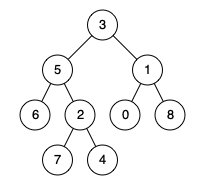LeetCode 1676. Lowest Common Ancestor of a Binary Tree IV
Tree
Input: root = [3,5,1,6,2,0,8,null,null,7,4], nodes = [4,7]
Output: 2
Explanation: The lowest common ancestor of nodes 4 and 7 is node 2.Input: root = [3,5,1,6,2,0,8,null,null,7,4], nodes = [1]
Output: 1
Explanation: The lowest common ancestor of a single node is the node itself.
Input: root = [3,5,1,6,2,0,8,null,null,7,4], nodes = [7,6,2,4]
Output: 5
Explanation: The lowest common ancestor of the nodes 7, 6, 2, and 4 is node 5.Input: root = [3,5,1,6,2,0,8,null,null,7,4], nodes = [0,1,2,3,4,5,6,7,8]
Output: 3
Explanation: The lowest common ancestor of all the nodes is the root node.Solution
PreviousLeetCode 1650. Lowest Common Ancestor of a Binary Tree IIINextLeetcode 1727. Largest Submatrix With Rearrangements
Last updated
